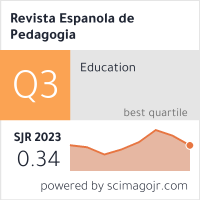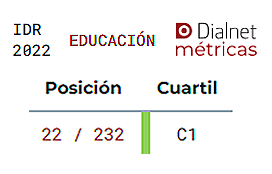Abstract
Introduction: this study is part of a research project concerning the teacher training in information and communication technologies (ICT) profile. Its aim is to develop and validate an instrument for measuring this profile in primary and secondary schools. Methodology: after developing the instrument and administering it to a sample of 1,433 teachers in the Community of Madrid, its reliability, content, and construct validity were analysed (the latter using Structural
Equation Models with the IBM SPSS-AMOS program). Results: the reliability analysis gave Cronbach’s Alpha = 0.973 for the whole of the instrument. For each dimension this figure was: Curricular Aspects, 0.738; Planning and Evaluation, 0.878; Methodological Aspects, 0.903; Use of ICT, 0.935; and ICT Training, 0.894. The discrimination coefficient values of the final instrument items ranged from 0.33 to 0.74. The Confirmatory Factor Analysis demonstrates a good fit of the model to the data (CMIN/DF = 5,138; CFI = 0,905; RMSEA = 0,056; PRATIO = 0,928). Conclusions: this instrument has therefore shown that it has the necessary technical characteristics to be considered a valid and trustworthy tool for measuring the teacher training profile in ICT.
Cite this article as: Fernández-Cruz, F. J., Fernández-Díaz, M. J., & Rodríguez-Mantilla, J. M. (2018). Diseño y validación de un instrumento de medida del perfil de formación docente en tecnologías de la información y comunicación | Design and validation of an instrument to measure teacher training profiles in information and communication technologies. Revista Española de Pedagogía, 76 (270), 247-270. doi: 10.22550/REP76-2-2018-03
Referencias | References
Aguaded, J. I. & Tirado, R. (2010). Ordenadores en los pupitres: informática y telemática en el proceso de enseñanza-aprendizaje en los centros TIC de Andalucía. Pixel-Bit. Revista de Medios y Educación, 36, 5-28. Retrieved from https://goo.gl/zVcCvE (Consulted on 12/12/2017).
Almerich, G., Suárez J. M., Belloch, C., Bo, R. y Gastaldo, I. (2005). Diferencias en los conocimientos de los recursos tecnológicos en profesores a partir del género, edad y tipo de centro. RELIEVE, 11 (2), 127-146.
Area, M. (2005). Las tecnologías de la información y comunicación en el sistema escolar. Una revisión de las líneas de investigación. Revista Electrónica de Investigación y Evaluación Educativa, 11 (1). Retrieved from http://goo.gl/1rLazN (Consulted on 15/10/2017).
Area, M., Hernández, V., & Sosa, J. J. (2016). Modelos de integración didáctica de las TIC en el aula [Models of educational integration of ICTs in the classroom]. Comunicar, 24 (47), 79-87. doi: 10.3916/C47-2016-08
Becta (2004). A review of the research literature on barriers to the uptak of ICT by teachers. London: British Educational Communications and Technology Agency (UK BECTA). Retrieved from http://goo.gl/o4PcHb (Consulted on 09/07/2017).
Bentler, P. M. (2005). EQS 6 Structural Equations Program Manual. Encino: Multivariate Software.
Byrne, B. (2010). Structural equation modelling with AMOS. (2nd ed.). New York: Taylor and Francis Group.
Cabero, J. (Ed.) (2000). Uso de los medios Audiovisuales, informáticos y las NNTT en los centros andaluces. Seville: Kronos.
Cebrián, M., Ruiz, J., & Rodríguez, J. (2007). Estudio del impacto del Proyecto TIC desde la opinión de los docentes y estudiantes en los primeros años de su implantación en los centros públicos de Andalucía. Málaga: Departamento Métodos de investigación e Innovación Educativa, Universidad de Málaga. Retrieved from https://goo.gl/FPdV4h (Consulted on 10/11/2017).
Consejería de Educación de Madrid (2016). Bases de datos del Instituto de Estadística de la C.A.M. Madrid: Consejería de Educación, Comunidad Autónoma de Madrid.
Cortada de Kohan, N. (1999). Teorías psicométricas y Construcción de Tests. Buenos Aires: Editorial Lugar.
De Pablos, J., Colás, P., & González, T. (2010). Factores facilitadores de la innovación con TIC en los centros escolares. Un análisis comparativo entre diferentes políticas educativas autonómicas. Revista de Educación, 352, 23-51. Retrieved from https://goo.gl/Gtdpxr (Consulted on 12/06/2015)
De Rada, V. D. (2012). Ventajas e inconvenientes de la encuesta por Internet. Papers: revista de sociologia, 97 (1), 193-223.
Del Río, S. D. (2013). Diccionario-glosario de metodología de la investigación social. Madrid: Editorial UNED
Espuny, C., Gisbert Cervera, M., & Coiduras Rodríguez, J. L. (2010). La dinamización de las TIC en las escuelas. Edutec: revista electrónica de tecnología educatica, 32, 1-16. Retrieved from https://goo.gl/SvPiUK (Consulted on 14/06/2017).
Fernández, M. D., & Álvarez, Q. (2009). Un estudio de caso sobre un proyecto de innovación con TIC en un centro educativo de Galicia ¿acción o reflexión? Bordón, 61 (1), 95-108. Retrieved from https://goo.gl/8zf8J1 (Consulted on 17/08/2017).
Fernández-Cruz, F. J., & Fernández-Díaz, M. J. (2016). Los docentes de la Generación Z y sus competencias digitales [Generation Z's Teachers and their Digital Skills]. Comunicar, 46, 97-105. doi: 10.3916/C46-2016-10
García-Valcárcel, A. (2003). Tecnología Educativa. Implicaciones educativas del desarrollo tecnológico. Madrid: La Muralla.
García-Valcárcel, A., & Tejedor, F. J. (2010). Evaluación de procesos de innovación escolar basados en el uso de las TIC desarrollados en la Comunidad de Castilla y León. Revista de Educación, 352, 125-147. Retrieved from https://goo.gl/vRJ2wn (Consulted on 04/09/2017).
Garrido, M. C., Fernández, R., & Sosa, J. M. (2008). Los coordinadores TIC en Extremadura. Análisis legislativo y valoración de su implantación en los centros educativos de primaria y secundaria de la región. Quaderns digitals. Eduteka. Retrieved from https://goo.gl/ f9ZKig (Consulted on 18/09/2017).
George, D., & Mallery, P. (2003). SPSS for Windows step by step: A simple guide and reference. 11.0 update (4th ed.). Boston, MA: Allyn & Bacon.
Gewerc, A. (2002). Crónica de un proceso anunciado: La integración de las tecnologías de la información y la comunicación en escuelas primarias de Galicia. In E. Pernas & Maria L. Doval (Eds.), Novas Tecnologías e innovación educativa en Galicia (pp. 211-228). Santiago de Compostela: ICE Universidad de Santiago de Compostela.
Hair, J., Anderson, R., Tathan, R., & Black, W. (2009). Análisis multivariante. Madrid: Pearson.
Hayduk, L. A. (1996). LISREL Issues, Debates and Strategies. Baltimore, MD: Johns Hopkins University Press. INTEF (Octubre 2017). Marco Común de Competencia Digital Docente. Retrieved from https://goo.gl/Fq8ve9 (Consulted on 22/01/2018).
Carretero, S., Vuorikari, R. y Punie, Y. (2017). DigComp 2.1: The Digital Competence Framework for Citizens with eight proficiency levels and examples of use. Brussels: Joint Research Center, European Comission. Retrieved from https://goo.gl/g4v4yR (Consulted on 22/01/2018).
JRC (2017). Digital Competence Framework for Educators (DigCompEdu). Brussels: Joint Research Center, European Comission. Retrieved from https://goo.gl/DpTD7V (Consulted on 22/01/2018).
Kline, R. (2010). Principles and practice of structural equation modelling (3rd edition). New York: The Guilford Press.
Marcelo, C., & Estebaranz, A. (1999). Cultura escolar y cultura profesional: los dilemas del cambio. Revista Educar, 24, 47-69. Retrieved from https://goo.gl/w2NXVx (Consulted on 18/12/2017).
Marchesi, A., Martín, E., Casas, E., Ibáñez, A., Monguillot, I., Riviere, V., & Romero, F.(2005). Tecnología y aprendizaje. Investigación sobre el impacto del ordenador en el aula. Madrid: Ediciones SM.
Mueller, J., Wood, E., Willoughby, T., Ross, C., & Specht, J. (2008). Identifying discriminating variables between teachers who fully integrate computers and teachers with limited integration. Computers & Education, 51 (4), 1,523-1,537. doi: 10.1016/j.compedu.2008.02.003
Pérez, M. A., Aguaded, J. I., & Fandos, M. (2009). Una política acertada y la Formación permanente del profesorado, claves en el impulso de los Centros TIC de Andalucía (España). EDUTEC, Revista Electrónica de Tecnología Educativa, 29, 1-17. Retrieved from http://goo.gl/tPJnJ6 (Consulted on 22/10/2017).
Pérez-Juste, R. (1985). Definición operativa en la orden y otros, investigación educativa. Madrid: Anaya.
Prensky, M. (2001). Nativos digitales, inmigrantes digitales. On the Horizon, 9 (5), 1-6. Retrieved from http://goo.gl/4oYb (Consulted on 23/09/2017).
Ramboll Management (2006). E-Learning Nordic 2006: Impact of ICT on education. Denmark: Ramboll Management. Retrieved from https://goo.gl/1JaziJ (Consulted on 25/02/2016).
Sancho, J. M. (2002). Herramientas vacías: educación y sentido en la sociedad de la información. In J. M. Vez, M. D. Fernández & S. Pérez Domínguez (Eds.), Foro Europeo: Educación Terceiro Milenio. Políticas educativas na dimensión europea. Interrogantes e reexións no umbral do terceiro milenio (pp. 157-168). Santiago de Compostela: ICE Universidad de Santiago.
Suárez-Rodríguez, J. M., Almerich, G., Díaz-García, I., & Fernández-Piqueras, R. (2012). Competencias del profesorado en las TIC. Influencia de factores personales y contextuales. Universitas Psychologica, 11 (1), 293-309. Retrieved from http://goo.gl/VCz6jD (Consulted on 24/07/2017).
Tejedor, F. J., & García-Valcárcel, A. (2006). Competencias de los profesores para el uso de las TIC en la enseñanza. Análisis de sus conocimientos y actitudes. revista española de pedagogía, 64 (233), 21-68. Retrieved from https://goo.gl/s8U4UU (Consulted on 08/07/2017).
Tejero, C. (2006). Burnout y dirección escolar: análisis de la influencia que sobre el síndrome ejercen las variables perfil demográfico-profesional, estrés, satisfacción e indefensión (Doctoral Thesis). Madrid: Universidad Complutense de Madrid.
Tejero, C., Fernández, M. J., & Carballo, R. (2010). Medición y prevalencia del síndrome de quemarse por el trabajo (burnout) en la dirección escolar. Revista de Educación, 351, 361-383.
Tourón, J., Martín, D., Navarro Asencio, E., Pradas, S., & Íñigo, V. (2018). Validación de constructo de un instrumento para medir la competencia digital docente de los profesores (CDD). revista española de pedagogía, 76 (269), 25-54. Retrieved from http://goo.gl/vhkb5b
UNESCO (2008). Normas UNESCO sobre competencias en TIC para docentes. Paris: UNESCO. Retrieved from https://goo.gl/8fWKFP (Consulted on 12/12/2012). UNESCO (2011). UNESCO ICT Competence Framework for Teachers. Paris: UNESCO. Retrieved from http://goo.gl/oKUkB (Consulted on 12/12/2012).
Weaver, S. S. (2015). Measurement Theory. The International Encyclopedia of Communication, 1-4. New York: Wiley Online Library. doi: http://doi.org/10.1002/9781405186407.wbiecm016.pub3
Citación recomendada | Recommended citation
Fernández-Cruz, F. J.,
Fernández-Díaz, M. J.,
&
Rodríguez-Mantilla, J. M.
(2018)
.
Design and validation of an instrument to measure teacher training profiles in information and communication technologies.
Revista Española de Pedagogía, 76(270).
https://www.revistadepedagogia.org/rep/vol76/iss270/14
Licencia Creative Commons | Creative Commons License
Esta obra está bajo una licencia internacional Creative Commons Atribución-NoComercial 4.0.
This work is licensed under a Creative Commons Attribution-NonCommercial 4.0 International License
Palabras clave | Keywords
digitalcompetency, factoranalysis, ICTstandards, teachercompetencies








